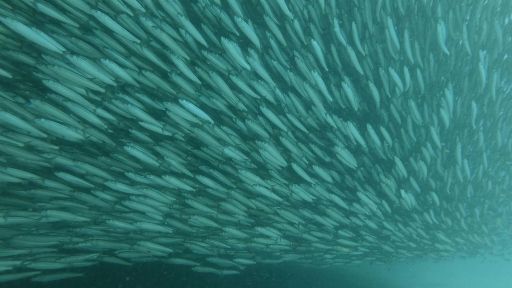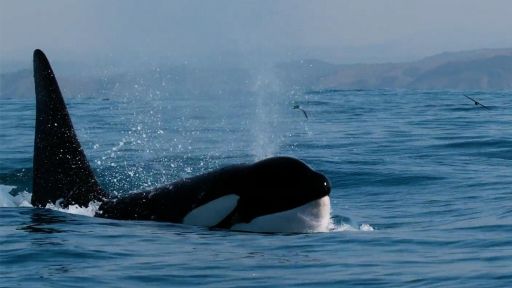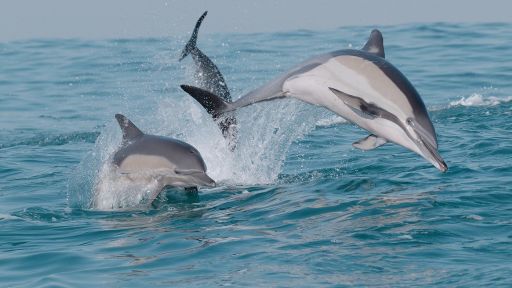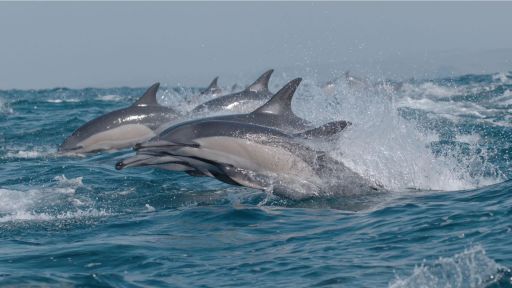The largest biomass migration on the planet takes place every winter along the South African coast – the annual Sardine Run. To film this mega-event, two film crews spent 4 weeks filming predators on their home turf and then following the sardine migration.
Features




The Ocean’s Greatest Feast “Making Of”
Producer & Writer
MEA TRENOR
Editors
ANDREW DICKINSON
RUAAN BOTHA
Narrator
GRAHAM McTAVISH
Scientific Advisor
RYAN DALY
Camera Operators
TIMOTHY VAN VUUREN
LUYANDA SHABALALA
ANDREW POLLOCK
HERMAN OOSTHUIZEN
GRANT BROKENSHA
BORIS VON
SCHOENEBECK
Logistics Manager
JOLENE GALLET
Music
AUDIO NETWORK
Sound Edit and Final Mix
DAVE BIRCH
Post Production Manager
SIAN BUCKLEY
Production Finance
DAVID NAGLE
REENA GOVENDER
SAMANTHA RAMDHEO
Post Production Services
IGLOO POST
Media, Technical & Production Support
ANDRE MOODLEY
DANIELLE GOVENDER
DANIEL PHILOGENE
ERHARDT HAUMANN
FAYE COX
JOHN WALLETT
KEVIN LOURENS
RIAAN VAN DEN HEEVER
SONGEZIWE MAXONYANE
Locations
SOUTH AFRICAN NATIONAL PARKS
CAPE NATURE
DURBAN FILM OFFICE
RAY NKONYENI MUNICIPALITY
DEPARTMENT OF ENVIRONMENT, FORESTRY AND FISHERIES OF SOUTH AFRICA
Executive Producers
GRAEME DUANE
CHRIS FLETCHER
Head of Production Management & Operations
NOELEEN PADAYACHEE
Group Chief Operating Officer
LARA COX
© 2022 THIRTEEN Productions LLC, Earth Touch USA LLC and Bonne Pioche Television
(waves crashing gently) - [Narrator] Every year, the biggest biomass migration on the planet happens on the coast of South Africa.
Billions of sardines undergo a mystery migration.
(birds squawking) (water splashing) And predators are drawn from all corners of the ocean.
The Greatest Feast team aims to film all of them.
Just as the sardine run begins.
They check in with predator colonies.
First up, the 4,000 Cape fur seals that are preparing to meet the fish.
- Early morning and the seals are waking up.
We got the bulls, the pups that are born in November.
We got the females that are still playing around.
- Conditions are absolutely beautiful.
So it's a good start, looking good.
- [Narrator] As the seals mobilize, Cape gannets take to the skies.
But getting to the colony isn't easy.
- This is the treacherous pier.
This is where we're gonna be staying for the next few days.
This was built many years ago.
(birds squawking) Can't actually film.
There's much flipping dust.
I have to actually keep my eye to the view finder, Otherwise, yeah, you just, you can't see anymore.
- [Narrator] It's noisy and smelly.
(dramatic music) - It's just a visual extravaganza.
You can't believe what you're seeing, thousands of birds.
It's just, it's one of my favorite places in the world.
- [Narrator] The crew time it just right.
Hungry seals are here to feed on baby gannets.
An unexpected twist to the sardine story.
Then, the wild coast awaits.
This is the arena in which the run will play out.
Will the shoals make it this far?
No one knows.
- Have you seen any animal activity this morning?
- [Voice Over Radio] Very very quiet, the whole pier's quiet.
- [Narrator] Then good news comes in.
Shoals have been spotted.
(dramatic music) It's been weeks of waiting and preparation, but it looks like Mother Nature is on their side.
- [Boris] We get up at least an hour, hour and a half before sunrise, it's still dark.
We prep the gear.
We make sure all the gears is working.
- [Steve] Sun is rising and the shot over is turning.
- [Narrator] Two crews and a technology for every scenario.
(boat motor whirring) (drone buzzing) - A lot of the gear has gotten smaller.
In the past, underwater housings and rigs and systems were absolutely gigantic.
These days, they've been consolidated down.
We seem to have more toys now.
But it's also pretty amazing that we've got all the bits and pieces that we need to be able to document whatever situation as accurately as possible, whether that being having shot overs, underwater rigged systems or drones.
You know, in this day and age, it's pretty amazing that we can deploy whatever the right camera is in the right situation.
- For having the shot over, which stabilizes the horizon and gives you those stable shots.
Even when the sea is on its head.
- [Narrator] Finally, the mother load arrives.
(dramatic music) (water splashes) (dramatic music) And so do the predators.
(intense, dramatic music) (dolphins clicking) (drone buzzing) - Communicating with the Skipper's vital on one of these shoots, especially when shooting top side.
Because you want to be where the best light is.
And eventually the Skipper gets to what you want.
And he puts you in position like that.
(dramatic music) - The biggest challenge really over these periods is having the stamina to keep going for long periods of time.
It's obviously long, long days at sea.
Long, long hours, conditions are cold.
But also the incentive is there because you know that it's gonna be good to get out to sea.
We're all pretty excited to get out there and spend our time there.
(birds squawking) (intense, dramatic music) - [Narrator] Just as things hot up, an unexpected visitor arrives.
- The Bryde's whales are really sneaky.
You need eyes in the back of your head here.
(dramatic music) So I slipped into the water, and as I went in, the big male sort of turned and came straight towards the boat and then he dipped down.
And that, that dorsal fin is like six foot.
And you pop your eyes up, and you just see it going down into the water in front of you and yeah, you also, at that point you realize how small fish you are in the sea and how vulnerable you are.
But it's also, it's like excitement, I guess.
Your adrenaline's pumping, you're one on one with the ocean's probably apex predator.
- [Narrator] The orcas then hunt a dolphin, right in front of the boat.
(water splashing) (men exclaiming) (water splashing) (dramatic music) - [Timothy] I got that.
(loud splash) - This female just came out of the water at full speed, hit the dolphin like this, it came flying across frame, hit the water.
I wasn't even watching the camera.
I just, I stopped the record button and I just hoped that I got it.
And then I was literally like, there was just adrenaline.
I was shaking and looked at the other guys, you know and we all just started to like erupt.
Where you just go, yeah (laughs) Like it was one of the most amazing wildlife spectacles I've ever seen.
(men exclaiming) (dolphin clicking) - We got some lovely surprises, you know, huge pods of common dolphins.
Orcas.
(dramatic music) We got gannets.
(dramatic music) So yeah, we got a lot of what we were looking for.
- [Narrator] The sardines take the gap and escape into the blue.
(dramatic music) Until the feast brings everyone together again, next year.
(waves crashing)
